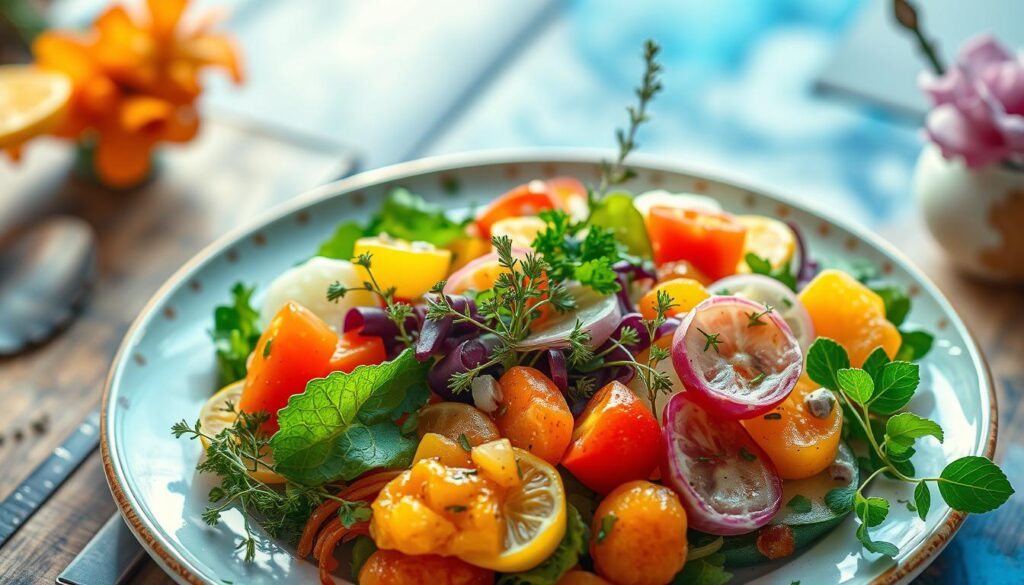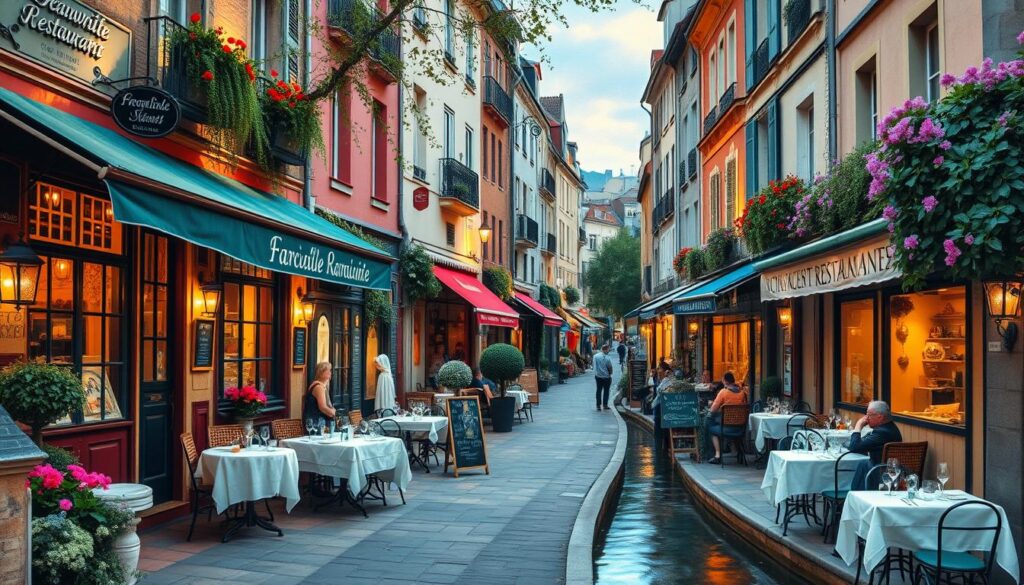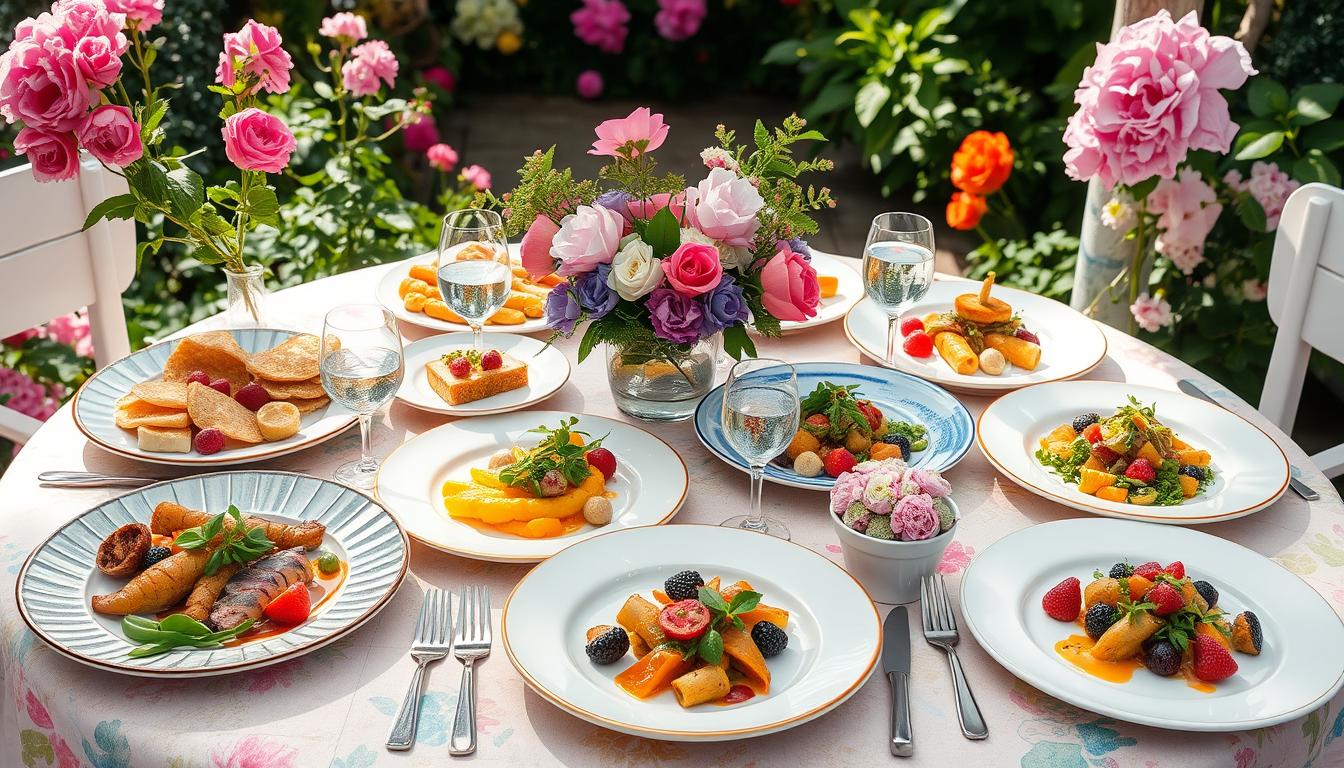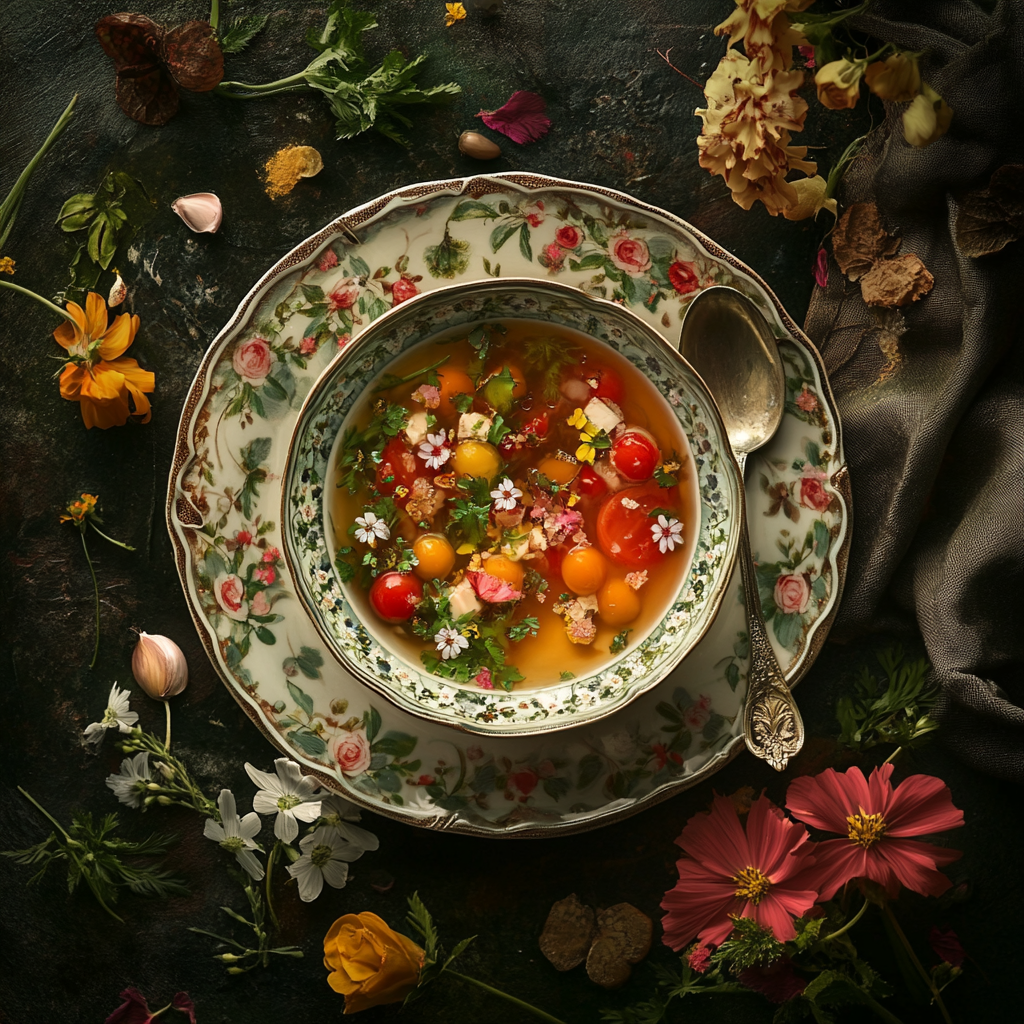Imagine eating a dessert that feels like Monet’s Water Lilies. Or savoring a dish that reminds you of his Poppy Field. The blend of art and food is truly fascinating, especially in Impressionist-Inspired Dishes.
Chefs worldwide are turning classic paintings into tasty, modern creations. By reinterpreting art through food, they bring the beauty of Impressionism to life in each bite. This fusion of art and gastronomy creates an unforgettable dining experience.
for more information, please visite aor blog: https://www.mymealrecipes.com
Key Takeaways About Impressionist-Inspired Dishes
- Chefs are finding new ways to make Impressionist art into food, using special techniques and ingredients.
- Restaurants are creating Impressionist-themed meals, from Monet menus to dishes inspired by famous paintings.
- Seasonal, local ingredients and bright colors are key in Impressionist food.
- Monet’s love for food and gardening inspires chefs today to honor him with their dishes.
- Impressionist art and food are coming together for a unique dining experience, combining sights, smells, and tastes.
Culinary Art Inspired by Paintings: Edible Impressionism in Impressionist-Inspired Dishes
Claude Monet, a famous Impressionist painter, loved food and gardening. He had a big garden at Giverny that gave him fresh ingredients. This inspired chefs to make dishes that look like Impressionist paintings.
Exploring Monet’s Love for Food and Gardening
Monet’s garden was a mix of herbs, flowers, and veggies. It shows how he loved nature and color. At the Enid A. Haupt Conservatory, you can see his gardens come to life.
The Peggy Rockefeller Rose Garden shows the beauty of different roses. It tells the story of roses and how they’re grown. This garden is a must-see for rose lovers.
Translating Impressionist Masterpieces onto the Plate with Impressionist-Inspired Dishes
Chefs and home cooks are now using art in their cooking. They turn simple ingredients into amazing dishes. This has led to new cooking techniques and flavors.
Artistic plating has become key in cooking. It makes simple dishes look amazing. This adds to the fun of eating.
Recipes inspired by famous paintings are becoming popular. They show how food can be a work of art. Many are exploring the mix of art and food, creating unique dishes.
| Event | Details |
|---|---|
| “Salad Days” event at the Ruth Rea Howell Family Garden | Offers hands-on activities with edible bounty, encouraging the exploration of various plant parts for salad making, engaging children in learning about healthy eating. |
| Cooking demonstrations | Held at 2 and 4 p.m. on Wednesdays, Saturdays, and Sundays, showcasing Impressionism-inspired dishes and techniques, fostering culinary creativity among participants. |
| Bird walks and garden tours | Scheduled to provide visitors with immersive experiences, allowing them to explore the different habitats of the Botanical Garden and engage with the diverse flora and fauna present. |
| Monet-inspired afternoon tea experience | Available from September 1st to 30th, 2023, priced at S$68++ per guest with options for additional amuse bouche and free-flowing champagne. A children’s menu is also available for S$40++. |
The art of gastronomy aims to make dining more enjoyable. It combines creative cooking with artistic presentation. This turns meals into a feast for the senses.
Gastronomic Masterpieces: Plating and Presentation Artistry in Impressionist-Inspired Dishes
Chefs and restaurateurs are making every plate a work of art. They use plating and presentation techniques to create gastronomic masterpieces that remind us of Impressionism. They arrange ingredients carefully and add unexpected textures and shapes. This turns the table into a gallery of edible art.
Rasmus Munk, the head chef at Alchemist in Copenhagen, leads this culinary revolution. He focuses on creating a multi-sensory experience, not just chasing Michelin stars. His 50-course tasting menu combines traditional dishes with artistic expressions, aiming to bring taste-triggered euphoria to diners.
“Gastronomy is evolving to become a true art form, focusing on the mix of flavor, presentation, and dining experience to elevate the overall enjoyment of food.”
Munk’s work goes beyond the plate. He works with MasterChef finalists to create dishes like candyfloss dumplings. This fusion of culinary skills and artistic genius makes dining at the Alchemist a feast for the senses.
The Alchemist’s focus on plating and presentation artistry shows a broader trend in the culinary world. Chefs worldwide are blending culinary techniques with artistic expression. They use unconventional ingredients and explore unique flavors, pushing the limits of what’s possible in the kitchen.
| Culinary Trend | Description |
|---|---|
| Abstract Recipes | Blending culinary art with modern artistic principles, resulting in visually stunning and innovative dishes. |
| Flavor Experimentation | Chefs are exploring unique taste profiles and flavor combinations to create memorable dining experiences. |
| Texture Focus | Enhancing the mouthfeel and overall sensory experience by emphasizing the role of texture in culinary creations. |
| Seasonal Ingredients | Showcasing the best of seasonal produce and highlighting their natural beauty and flavors. |
| Classic Reimagined | Transforming traditional recipes with a modern, avant-garde twist to create visually captivating dishes. |
The line between culinary arts and fine arts is blurring. This makes dining a true sensory journey. The artistry of plating and presentation is key to enhancing our enjoyment of food.
Flavors Evoking Impressionist Palettes in Impressionist-Inspired Dishes
Impressionist painters changed the art world with their bold colors and light. Now, chefs are inspired by these artists to make dishes that feel like Impressionism. They pick ingredients and techniques that capture the essence of impressionism to take diners into this famous art movement.
Ingredients and Techniques that Capture the Essence of Impressionism
Chefs use fresh, local ingredients and natural dyes for their dishes. They also try new flavor combinations. This all aims to bring the Impressionist style to life.
- Vibrant, flavors evoking impressionist palettes like bold reds, deep purples, and vibrant greens
- Delicate, ephemeral textures that mirror the fleeting quality of light captured by Impressionist painters
- Innovative plating techniques that mimic the gestural, spontaneous brushstrokes of Monet, Renoir, and their contemporaries
- Flavor combinations that challenge traditional expectations, much like the Impressionists challenged artistic norms
These chefs are not just making pretty dishes. They’re creating experiences that touch all our senses. Just like Impressionists captured moments, these chefs redefine how we enjoy our food.
“Painting is the most direct way of expressing one’s feelings and emotions. In the same way, I believe cooking can be a powerful means of artistic expression, capturing the fleeting beauty of light and atmosphere on the plate.”
– Chef Jean-Georges Vongerichten, renowned for his Impressionist-inspired cuisine
From Monet to the Menu: Dishes Reflecting the Beauty of Impressionism in Impressionist-Inspired Dishes
Impressionist art has inspired many dishes that bring its colors and brushstrokes to life. Chefs have turned Monet, Cézanne, and others’ works into food. This lets diners enjoy Impressionism through taste.
A dish inspired by Monet’s “Water Lilies” is a real showstopper. It uses seafood, herbs, and flowers to mimic the painting’s colors. It’s a feast for both the eyes and the taste buds.

Cézanne’s still-life paintings inspired a unique ratatouille dish. It features vegetables and herbs arranged like the artist’s bold compositions. This dish shows off the beauty of ingredients in a new way.
Degas’ “The Millinery Shop” inspired a dessert that’s as detailed as the painting. It’s made of pastries and confections that look like the hats in the painting. Every part of this dessert is a tribute to culinary art.
Chefs keep finding new ways to mix art and food, thanks to Impressionism. They create dishes that let diners see and taste Impressionism in a special way.
Deconstructed Impressionist Dishes: A Modern Twist on Impressionist-Inspired Dishes
In the culinary world, Impressionism’s spirit is inspiring chefs. They’re reimagining classic recipes with a modern twist. These deconstructed impressionist dishes mix unexpected flavors and textures. They create a feast for the eyes and taste buds, capturing Impressionism’s essence.
Renowned chefs, inspired by Impressionist painting, are breaking culinary rules. They take familiar dishes and turn them upside down. This approach brings the spontaneity and boldness of Impressionist art to the table.
Reimagining Classic Recipes with an Avant-Garde Twist
Michelin-starred Jean-Georges Vongerichten has reimagined the classic ratatouille. He presents the ingredients in a unique, abstract way. Each part highlights its texture and taste, making a vibrant dish that embodies the Impressionist spirit.
Dominique Crenn, known for her creativity, has also reimagined the classic beef bourguignon. Her version combines tender beef with a silky parsnip puree and a tart cherry reduction. This dish is a feast for the eyes and taste buds, challenging traditional cooking.
“Cooking, like painting, is about capturing the essence of a moment in time and expressing it through the senses. The Impressionists revolutionized art, and we’re striving to do the same in the culinary world.”
– Chef Jean-Georges Vongerichten
These chefs are leading a culinary movement inspired by Impressionism. By reimagining classic recipes with an avant-garde twist, they redefine dining. They invite guests on a sensory journey that celebrates Impressionism’s beauty and spontaneity.
Culinary Interpretations of Artistic Movements
The Impressionist movement has greatly influenced the culinary world. Now, chefs and restaurateurs are inspired by many artistic movements. They use Cubism’s bold colors and Surrealism’s dreamlike visions to create unique dining experiences.
Chef Alain Passard is inspired by Paul Cézanne’s Post-Impressionist works. His dishes blend colors and textures, much like Cézanne’s paintings. Passard’s plates are edible masterpieces that delight the senses.
Chef Ferran Adrià, known for his innovative approach, is influenced by Cubism. His dishes break down familiar flavors and presentations. This creates unexpected and thought-provoking culinary experiences.
| Artistic Movement | Culinary Interpretation | Notable Chefs/Restaurants |
|---|---|---|
| Post-Impressionism | Harmonious blend of colors and textures, evoking the essence of still-life paintings | Alain Passard |
| Cubism | Deconstructionist techniques that challenge traditional food boundaries | Ferran Adrià |
| Surrealism | Dreamlike and imaginative presentations that blur the line between food and art | Grant Achatz, Wylie Dufresne |
Chefs like Grant Achatz and Wylie Dufresne are inspired by Surrealism. They create dishes that challenge our perceptions. These dishes take us on a journey of whimsy and wonder.
The culinary world is evolving, and artistic movements are influencing dishes more and more. These culinary interpretations of artistic movements delight our senses. They also inspire us to see food in a new, artistic way.
Impressionism on a Plate: Top Restaurants to Visit
For those who love Impressionist art, visiting top restaurants around the world is a must. These places offer amazing dining experiences inspired by Monet and other Impressionist artists. They bring Impressionism to life with their creative menus, stunning presentations, and cozy atmosphere.
Best Dining Experiences Inspired by Monet and His Contemporaries
Impressionism’s influence can be seen in fine dining, from Giverny’s landscapes to Paris’s streets. These restaurants use Impressionist colors, bold strokes, and movement in their dishes. They create unforgettable meals inspired by this iconic art style.
- The Monet Lounge, Singapore – Enjoy an afternoon tea inspired by Monet’s Giverny garden. It features delicate pastries and finger sandwiches.
- Café Monet, Paris – Try a menu that celebrates Monet’s love for food and gardening. It includes seasonal dishes and creative French classics.
- Impressions Restaurant, London – Experience a multi-course tasting menu that brings Impressionist paintings to life. It’s a feast for the eyes and taste buds.
| Restaurant | Location | Signature Dishes | Pricing |
|---|---|---|---|
| The Monet Lounge | Singapore | Monet-inspired afternoon tea set | S$68++ per guest, with optional add-ons for champagne and children’s menu |
| Café Monet | Paris, France | Seasonal vegetable tart, duck confit with cherry compote | À la carte, with prix fixe options available |
| Impressions Restaurant | London, UK | Impressionist-inspired tasting menu, featuring dishes like “Waterlily Pond” and “Haystacks” | £95 per person for the tasting menu |
These restaurants offer a chance to enjoy impressionism on a plate. They provide best dining experiences inspired by Monet and his contemporaries. Whether you love art or just great food, these top restaurants to visit are a unique treat.
Famous Restaurants to Visit in Saint-Mammes
Art and food lovers should not miss Saint-Mammes. This town by the River Seine was a favorite of Claude Monet. Now, it’s home to restaurants that celebrate Monet’s legacy with their food and atmosphere.
La Maison du Moulin is a standout. It’s in a historic grain mill Monet painted in 1888. The menu reflects Monet’s love for the local scenery, with dishes that match his Impressionist style.
| Restaurant | Monet’s Inspiration | Signature Dishes |
|---|---|---|
| La Maison du Moulin | The Grain Mill at Limetz-Villez | Monet’s Garden Salad, Impressionist Salmon Terrine, Willow Tree Tart |
| Auberge de la Reine Blanche | The Epte River and Surrounding Landscapes | Riverbank Mushroom Risotto, Impressionist Ratatouille, Reflections Crème Brûlée |
| Café des Artistes | The Artist Colony in Giverny | Palette of Seared Scallops, Monet’s Palette Tasting Plate, Impressionist Fruit Tart |
Auberge de la Reine Blanche honors the Epte River and landscapes Monet loved. Their menu brings Monet’s colors and light play to life.
Café des Artistes celebrates Giverny’s artist colony. It offers dishes inspired by Impressionist painters and their visions.
Whether you love Monet or just Impressionist cuisine, these Saint-Mammes restaurants are a must-visit. They offer a unique culinary journey through Monet’s world.

Monet’s Palate: Recipes from Giverny
Explore the culinary world that inspired Impressionist painter Claude Monet. This section uses Monet’s recipe journals and his famous kitchen garden at Giverny. It shares authentic dishes that were part of Monet’s cooking.
Authentic Dishes from the Artist’s Kitchen Garden
Enter Monet’s world and taste the vibrant flavors that might have inspired his paintings. Monet loved fresh vegetables and used copper cookware. These recipes from Giverny show the authentic dishes Monet enjoyed, fueling his creativity.
| Dish | Key Ingredients | Monet’s Connection |
|---|---|---|
| Ratatouille à la Monet | Eggplant, zucchini, bell peppers, tomatoes, herbs | Vibrant colors and fresh flavors from Monet’s kitchen garden |
| Monet’s Favorite Tarte Tatin | Apples, butter, sugar, pastry | Monet’s love for seasonal, locally-sourced produce |
| Monet’s Vichyssoise | Potatoes, leeks, cream, chives | Monet’s appreciation for the simple pleasures of French cuisine |
Dive into the monet’s palate and bring Impressionism to your kitchen. These authentic dishes from the artist’s kitchen garden take you to Giverny’s serene beauty, where Monet found inspiration in every meal.
Conclusion: Embracing the Impressionist Spirit in Cuisine
Impressionism’s impact goes beyond art, touching the world of food. Its spirit of spontaneity and love for nature inspires chefs. They turn meals into a form of art.
Chefs, like Impressionist artists, connect sight, taste, and touch through their dishes. They aim to capture the beauty of light and atmosphere. This creates a unique and engaging dining experience.
Enjoying these dishes invites us to see the world with fresh eyes. The Impressionist way teaches us to appreciate the small things. It encourages us to live in the moment and find beauty in imperfection.


